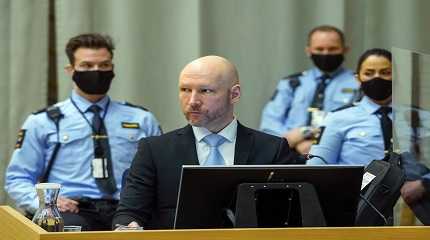
STAVANGER, Norway (AP) — Anders Behring Breivik, the Norwegian right-wing extremist who killed 77 people in a bomb and gun rampage in 2011, will try for the second time Monday to sue the Norwegian state for allegedly breaching his human rights.
Norway’s worst peacetime killer claims his solitary confinement since being imprisoned in 2012 amounts to inhumane treatment under the European Convention of Human Rights.
Norway favors rehabilitation over retribution, and Breivik is held in a two-story complex with a kitchen, dining room and TV room with an Xbox, several armchairs and black and white pictures of the Eiffel Tower on the wall. He also has a fitness room with weights, treadmill and a rowing machine, while three parakeets fly around the complex.
Even so, his lawyer, Øystein Storrvik, says it is impossible for Breivik, who now goes by the name Fjotolf Hansen, to have any meaningful relationships with anyone from the outside world, and says preventing his client from sending letters is another breach of his human rights.
A similar claim during a case in 2016 was accepted, but later overturned in a higher court. It was then rejected in the European Court of Human Rights. Breivik sought parole in 2022, but was judged to have shown no signs of rehabilitation.
On July 22, 2011, Breivik killed eight people in a bomb attack in Oslo before heading to a youth camp for a center-left political group on Utøya island, where, dressed as a police officer, he stalked and gunned down 69 people, mostly teenagers. The following year, Breivik was handed the maximum 21-year sentence with a clause — rarely used in the Norwegian justice system — that he can be held indefinitely if he is still considered a danger to society.
He has shown no remorse for his attacks, which he portrayed as a crusade against multiculturalism in Norway.
Many regard Breivik’s flirtations with the civil and parole courts as attempts to draw attention to his cause or even bask once again in the international limelight, as he had done at times during his criminal trial. Lisbeth Kristine Røyneland, who leads a support group for survivors of the attacks and bereaved families, says her group is “satisfied with the decision” not to allow a livestream of his comments from this court case.
The state rejects Breivik’s claims. In a letter to the court, Andreas Hjetland, a government attorney, wrote that Breivik had so far shown himself to be unreceptive to rehabilitative work and it was “therefore difficult to imagine which major reliefs in terms of sentencing are possible and justifiable.”
The trial will be held Monday in the gymnasium in Ringerike prison, a stone’s throw from Utøya.




